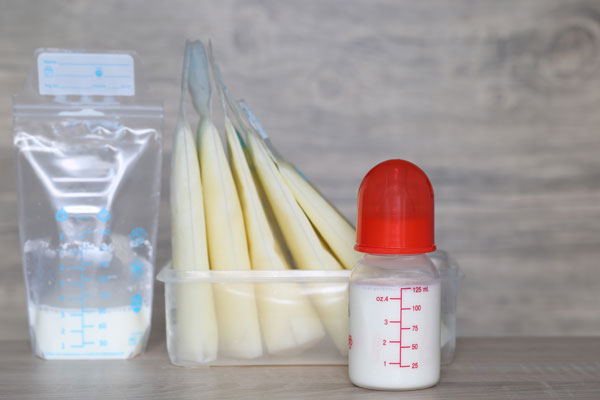Are you tired of cleaning spit-ups and washing clothes covered with white milky liquid? Do you hear all the time that exclusive breastfeeding will solve the spit up problem, but you were doing that right before your baby starts spitting up after feeding breast milk? This must be a worrisome situation for you. But don’t you worry, this article will help you understand this issue and answer your questions.

Breast milk is the best nutrient-filled food for babies. Every mother wants to breastfeed their babies as much as possible. However, certain problems make this phase difficult for mothers. Spitting up breast milk is one such issue.
Spitting up is common in babies. A feeding baby tends to throw up once in a while. Some babies spit up more frequently than others. Spitting up depends on various factors, and there could be multiple reasons behind this behaviour.
Some mothers complain that their babies happily drink the breastmilk but spit-up formula, but it is another way around for some babies. They happily take formula milk but spits up breast milk. With babies, you can never 100% predict a behaviour. Babies may behave a certain way at a time and then totally change their behaviour.
Common reasons for spit-up
Spitting up is a commonly occurring behaviour in feeding babies. There can be different reasons for throwing up after feeding milk.
- Babies tend to spit up a little when they burp. While feeding, babies swallow air bubbles that release during burping. This can be accompanied by little milk as well.
- Sometimes babies suck milk hastily and swallow a lot of air, which comes out along with spit-up.
- Mothers that have fast let down also experience the issue of throwing up.
- Some babies tend to overeat, but their little stomachs don’t accept this and spit up the extra milk.
- Babies’ digestive system is developing, and the sphincter that holds the milk in the stomach sometimes is not that reliable and let the milk from the stomach up to the oesophagus into the mouth.
- Some babies’ stomachs don’t like the contents of formula or breastmilk, and this throws up.
- In some severe cases, babies may suffer from reflux or GERD, which leads to frequent spit-ups.
Spit up vs vomit
These are some common reasons for spit ups in babies. Although spit up is a common issue, parents, especially first-time mothers, worry a lot about this issue. Some mothers find it difficult to differentiate between spit-ups and vomit. Moreover, different colours and textures of spit-up mean other things.
Before moving further, let’s review the differences between spit-up and vomit.
| Spit ups | Vomiting |
| Babies spit up without any effort or pain | Vomiting is usually painful and forceful. |
| Spit ups are usually small in amount. | Vomiting is usually large in amount. |
| Spit up is mostly of white colour watery, or curdled milk. | Vomiting can vary in colour depending on the problem, and it can be blue, yellow, green colour. And can be like mucus. |
| The baby will be happy and cheerful after spit ups. | Babies will appear tired and sleepy after vomiting. |
| There will be no impact of spit ups on the weight, wet diapers, and in general, milk intake of babies. | In case of vomiting, babies lose weight, less wet diapers and less milk intake. |
| The basic purpose of spit ups to release trapped air bubbles in the stomach. | Vomiting is the result of some health issue. |
Thus, spit ups are more natural and relatively healthy, while vomiting indicates health issues and concerns. Thus before reaching any conclusion, it is necessary to differentiate between spit-ups and vomiting. Sometimes mothers get concerned over the throw-ups of babies considering it vomiting, but it actually would be spit ups.
Breast milk vs formula
Some babies tend to spit up after feeding breast milk but easily digest the formula milk. Although formula milk is manufactured to match the nutrient levels of breastmilk, both are different.
Below mentioned is some basic comparison between breast milk and formula milk.
| Breast milk | Formula milk |
| Breast milk changes its nutrients as per the needs and requirements of the baby. | Formula milk has a consistent taste and nutrients. |
| Breast milk is differentiated into foremilk and hindmilk. | Formula milk has the same consistency throughout the feed. |
| Babies have to suck the milk from the breast actively. | Depending on the nipple flow rate, it is comparatively easy to drink milk from the bottle. |
| Breast milk contains traces of what the mother eats. | Formula milk is free of such changes. |
| Breast milk always is at the right temperature. | Making formula milk requires great precautions. |
These are the primary differences between formula and breast milk. You should be fully aware of these dissimilarities because these have an impact on the spit up behaviour of babies.
Now that you have gone through the difference between spit-up and vomit and the dissimilarities between breast milk and formula milk, we will now move towards all the possible reasons for spitting up breast milk but not the formula.
Reasons for why baby spit up breast milk but not the formula
As I mentioned earlier, every baby is different, behaves differently in different situations and sometimes even in the same situation. So, we cannot be sure why your baby is spitting up breast milk. He may be totally fine yesterday, but today is not retaining any milk in his tummy, and you are worried about what you should do.
There could be several reasons that can make your baby throw up breast milk.
1. Swallowing of air bubbles while feeding
Swallowing excessive air during feeding leads to excessive air building up in the stomach. In this situation, burping release the air, but it is accompanied by milk and thus the throw-up. Air can be swallowed because of different causes.
Quickly sucking the breast milk and swallowing milk rapidly causes the baby to take bigger mouthfuls, and they tend to swallow air with it.
The fast letdown of the mother also leads to fast gulping and swallowing air bubbles.
This leads to air building up, and every time the mother burp the baby to release this air in the stomach, babies spit up a little.
Spitting up a little after feedings is normal. Some babies spit up even after an hour or two hours of feeding. This is not an issue of concern unless your baby is vomiting and related symptoms.
Compared to breastfeeding, bottle feedings are somewhat controlled because you can observe your baby sucking and swallowing milk. You can then adjust the position of the bottle or baby and can check the nipple flow. Your active observation of bottle-feeding decreases the spit up instances after formula feeding.
2. Underdeveloped digestive system
Babies’ digestive system is not entirely developed. The sphincter muscles that retain the food contents in the stomach are weak in the babies and are growing. Thus in the case of burping, air bubbles escape from the oesophagus, accompanied by some stomach contents.
Babies with little stomachs and immature digestive systems have difficulty holding the milk in their stomach while releasing air. If you observe that this is the case with your baby, then you shouldn’t worry. The bellies and digestive system will develop and mature with time. The babies also then will stop throwing up.
Formula milk tends to be heavier than the breast milk and can stay in the stomach relatively easily than breast milk, which contains both foremilk (that is lighter) and hindmilk (that has thicker consistency). Thus your baby finds it easy to keep down the formula milk but spit up the breast milk.
3. Overfeeding
Some babies like to overeat in little time. Babies also like to latch and feed. Some babies also comfort feed or overeat when they are not feeling well or are anxious. In such instances, they overeat, but their little tummies cannot contain excessive milk and throw up extra milk.
Overeating is also not an issue of concern as babies learn to regulate their feeding with time, and their spitting reduces gradually.
It isn’t easy to know if a baby overfed while breastfeeding. While bottle-feeding, you can easily monitor the feeding portion for your baby, thus regulating their milk intake, reducing spit ups.
4. Food allergies
Breastmilk is a highly nutritious food for babies, and it has the unique property of changing its nutrients and contents as per babies’ needs. Moreover, breast milk also contains traces of mothers’ diet. That’s why it is advised to control caffeine and alcohol consumption when you are a breastfeeding mother.
Thus whether you eat dairy, fruits, vegetables, grains or whatever, your baby also gets those nutrients. Sometimes the babies’ little stomachs are intolerant of certain food groups or contents, i.e. lactose or dairy intolerance, inability to digest wheat etc. In this situation, the sensitivity of babies’ stomach makes them throw up milk.
Although the ability to change its contents as per babies’ needs is a significant benefit of breast milk, this can become a problem for some babies. On the other hand, formula milk has the same nutrients every time, and thus babies’ stomachs get used to its nutrients and don’t throw up.
5. Maternal stress
Although it may sound strange for you, the psychological health of mothers also impacts the contents of breast milk, the mood of the baby, and the physical health of the babies. Babies of depressive mothers tend to be more upset, has more health issues and gastrointestinal issues.
This issue is not recognized and acknowledged by the mothers and society in general. Still, even minor and subclinical mental health problems can severely impact the physical and psychological health of babies. If you are feeling stressed lately and your baby is also showing symptoms around that time, you find the culprit here.
Formula milk, on the contrary, is free of such issues and mothers physical and psychological condition. Thus your baby doesn’t spit up formula milk but throws up breast milk.
How to avoid this problem?
The above discussed are some primary reasons for throwing up breast milk but not the formula. Now we will get to some strategies that you can practice to avoid this issue.
1. Different feeding positions
To avoid the gulping of air bubbles during feeding, you can try different positions to facilitate smooth nursing. If the baby is too distracted during nursing sessions and is trying to look around while latching on your breast, try to feed in a calm and distraction-free setting.
2. Burping is important
Burp your baby frequently, and don’t lay him down until he doesn’t burp. It is also advisable to burp your baby within feeding sessions, i.e., while breast side. This will release the air in the stomach and can reduce the spit-up instances.
3. Small feeding sessions
Practice small but frequent feeding sessions. Small feeding sessions don’t make your baby overeat, and you can also burp him easily. But small feeding sessions doesn’t mean leaving your baby’s hunger insatiate. Keep your baby’s needs in mind while practising this strategy. You can also feed your baby multiple times at intervals, but this can be time-consuming for some mothers.
4. Manage the flow
You can manage a fast letdown by pumping some milk before feeding your baby. This will slow the milk flow and make it more manageable for the baby to drink milk. But remember to pump before your baby gets hungry. If you start pumping when your baby needs milk, he will get hungrier and will feed hastily. This will waste the purpose of pumping.
5. Observe the hunger cues
Feed your baby before his hunger become unbearable for him, and he became angry. Angry baby either refuse the breast or drink too quickly, swallowing a lot of air along with milk. Thus be careful in observing the hunger cues and follow your baby’s needs rather than your schedule.
6. Don’t overfeed or underfeed
Sometimes, to stick to the schedule, the mothers try to feed the baby when he is not hungry or is already full from the previous feed. This way, making them overeat. The babies then will spit up because there is not enough space in the stomach.
Likewise, sometimes, mothers don’t feed the baby when he is hungry because he ate half an hour before. They attribute their baby’s crankiness to some other discomfort. However, when they feed the baby, he will suck milk hastily, resulting in gulping air bubbles more than usual. So don’t ignore the cues and signals given by babies.
7. Keep your baby upright after feedings
Don’t lay down your baby immediately after feeding; also, don’t bounce him or get him engaged in stimulating activity. Also, don’t lay him on his stomach. Too many movements after feeding make it difficult for the sphincter muscles to hold the milk, and thus the baby can spit up.
8. Tummy time
Practice some tummy time with your baby. Long after feeding, when your baby is in a happy and playful mood, lay him down and put some pressure on his abdomen. This will release the extra air and gas from the baby’s stomach and will be less likely to spit up.
9. Mommy, it would help if you are relaxed and not get overstressed
Babies are complicated, and parenting is never easy. Keep yourself together and calm. It is possible that your baby may stop spitting up after you practice the techniques mentioned above, or it is also possible that he permanently hook up to formula because of some rare food allergy. Either way, your focus should be on the best for your baby. Never lose your cool while upbringing your children, and remember to enjoy the process.
Always remember, fed is the best, either it is breast milk or formula. So your main aim should be to fulfil the hunger of your baby.
10. Don’t hesitate in consulting the paediatrician
However, if you are still unsure and your sixth sense is saying something is wrong, go with your gut. Consult your paediatrician and get answers to all your questions. If you are not satisfied with the answers, change the paediatrician.
If you are too bothered by your baby’s spitting up, you should definitely try the tips mentioned above. I am very optimistic that your problem will be resolved.
Endnote
Spiting up breast milk but not formula is a source of great frustration for nursing mothers. However, there can be various reasons for this issue, including excessive air in the stomach, immature digestive system, food allergies, and maternal stress. However, you can tackle these problems using various cautious steps like changing feeding position, practising small and multiple feeding sessions, tummy time, managing the flow and feeding your baby when hungry. Moreover, you can also practice burping regularly, regulating the feeding sessions, and keeping your baby in the upright position after nursing sessions. You should remain calm during this situation and consult the paediatrician if necessary.




